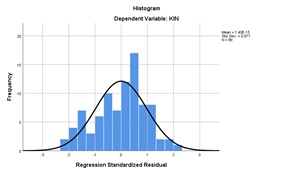
ANALISIS FAKTOR YANG MEMENGARUHI KINERJA PENGADAAN BARANG/JASA DALAM KEADAAN DARURAT WABAH COVID-19 DENGAN SOCIAL DISTANCING SEBAGAI VARIABEL MODERATOR
 ), Muhammad Heru Akhmadi (Politeknik Keuangan Negara STAN)(2),
), Muhammad Heru Akhmadi (Politeknik Keuangan Negara STAN)(2),
(1) Kementerian Keuangan
(2) Politeknik Keuangan Negara STAN
 Corresponding Author
Corresponding Author
Abstract
Abstract
The purpose of this study was to analyze the factors affecting the performance of the procurement of goods/services in the emergency of the Covid-19 plague with the addition of social distancing as a moderator variable. The study was conducted at the provincial government of DKI Jakarta. It was purposely selected due to the fact that the government has a sound procurement system. The general objective of the study was to analyze the factors that affect procurement performance in government organizations and the effect of social distancing on that relationship in the emergency situation during the Covid-19 plague. The specific objective of the study was; to determine the effect of government regulation for emergency procurement, e-procurement implementation employee competency, and management’s commitment to the procurement performance during an emergency situation. This entailed the use of questionaries. The key finding of the study indicated that government regulation for an emergency situation, employee competency, and implementation of e-procurement positively affected procurement performance in the emergency situation of the Covid-19 plague. Furthermore, the study found that social distancing did not affect the relationship between the above-mentioned factors and procurement performance during an emergency situation.
Abstrak
Penelitian ini menganalisis faktor-faktor yang mempengaruhi kinerja pengadaan barang dan jasa dalam keadaan darurat wabah Covid-19 dengan menggunakan social distancing sebagai variabel moderator. Penelitian dilakukan di Pemprov DKI Jakarta sebagai organisasi yang telah memiliki sistem pengadaan yang baik melalui data kuesioner. Tujuan khusus dari penelitian ini adalah untuk mengetahui pengaruh peraturan pemerintah dalam pengadaan darurat, penerapan e-procurement, kompetensi pegawai, dan komitmen manajemen terhadap kinerja pengadaan pada saat keadaan darurat. Hasil penelitian menunjukkan bahwa regulasi pemerintah untuk situasi darurat, kompetensi pegawai, dan implementasi e-procurement berpengaruh positif terhadap kinerja pengadaan dalam situasi darurat wabah Covid-19. Sebagai tambahan, hasil penelitian juga menunjukkan bahwa variabel social distancing tidak memoderasi pengaruh empat faktor terhadap kinerja pengadaan barang dan jasa. Penggunaan teknologi informasi memungkinkan komunikasi dalam penyelesaian tugas tetap terjaga sehingga kinerja pengadaan barang dan jasa tidak terganggu selama pandemic Covid-19.
Keywords
References
W. Wardiana, “Sosialisasi Pencegahan Korupsi pada Pengadaan Barang dan Jasa,” 2017. http://www.romadan.kemenkeu.go.id/Modul/GetPdfFile?fileName=Sosialisasi Pencegahan Korupsi PBJ.pdf (accessed Nov. 12, 2020).
W. Alamsyah, L. Abid, and A. Sunaryanto, “Laporan Tren Penindakan Kasus Korupsi Tahun 2018,” 2018. [Online]. Available: https://antikorupsi.org/sites/default/files/laporan_tren_penindakan_kasus_korupsi_2018.pdf.
S. Wildansyah, “ICW: Korupsi Pengadaan Barang 2017 Meningkat, Negara Rugi Rp 1 T,” Detik.com, 2018. https://news.detik.com/berita/d-3885311/icw-korupsi-pengadaan-barang-2017-meningkat-negara-rugi-rp-1-t (accessed Sep. 16, 2020).
“Ihktisar Hasil Pemeriksaan Semester I dan II Tahun2016,” Jakarta, 2016.
A. Sanchez-Graells, “Procurement in the Time of COVID-19,” SSRN Electron. J., pp. 1–10, 2020, doi: 10.2139/ssrn.3570154.
Redaksi Kumparan, “Melihat Kembali Kasus Korupsi Alkes yang Menjerat Eks Menkes Siti Fadilah,” Kumparan.com, 2020. https://kumparan.com/kumparannews/melihat-kembali-kasus-korupsi-alkes-yang-menjerat-eks-menkes-siti-fadilah-1tULmqYFQBE/full (diakses 16 September 2020) (accessed Sep. 16, 2020).
P. . W. Kingori and D. K. Ngugi, “Determinant Of Procurement Performance At Retirement Benefit Authority In Kenya,” Eur. J. Bus. Manag., vol. 1, no. 11, 2014.
R. Kasisi, M. M. Benjamin, and G. H. Mwangi, “Factors Affecting the Performance of the Procurement Function in Government Organisations : A Case Study of National Oil Corporation of Kenya,” Int. J. Sci. Eng. Res., vol. 3, no. 10, pp. 30–35, 2015.
T. Aryati and L. Pangaribuan, “Analisis Pengaruh Implementasi E-Procurement Dan Kompetensi Pegawai Terhadap Kinerja Pengadaan,” Penelit. Dan Karya Ilm., vol. 4, no. 1, p. 19, 2019, doi: 10.25105/pdk.v4i1.4012.
L. Heriawati, “Pengaruh Penerapan Electronic Procurement dan Good Governance Terhadap Kinerja Pengadaan Barang dan Jasa Pada Bagian Pengadaan Barang dan Jasa Sekretariat Daerah Kab Pandeglang,” Institut Ilmu Sosial dan Manajemen STIAMI, 2018.
Sugiyono, Metode Penelitian Bisnis (Pendekatan Kuantitatif, Kualitatif, dan R&D. Bandung: Alfabeta, 2016.
M. N. Amtiran, “Analisis Pengaruh Insentif dan Faktor Motivasi terhadap Kinerja Anggota Kelompok Kerja (POKJA) Unit Layanan Pengadaan Pemerintah Daerah Kabupaten Sumba Timur,” Universitas Terbuka, 2015.
Y. G. Sucahyo and Y. Ruldeviyani, Implementasi E-Procurement Sebagai Inovasi Pelayanan Publik. Jakarta: Lembaga Kebijakan Pengadaan Barang/Jasa Pemerintah, 2009.
Wibowo, Manajemen Kinerja. Jakarta: Raja Grafindo Perkasa, 2007.
R. Pamacheche, R. Chinomona, and T. Chuchu, “Management’s Commitment, Education and Ethics on Organisational Entrepreneurship: The Case of South African Non-Profit Organisations,” J. Econ. adn Behav. Stud., vol. 8, 2016.
D. Ginanjar, “Analisis Faktor yang Memengaruhi Efektivitas Perencanaan Pengadaan,” Politeknik Keuangan Negara STAN, 2017.
M. Koren and R. Pető, “Business disruptions from social distancing,” no. March, pp. 1–15, 2020, [Online]. Available: http://arxiv.org/abs/2003.13983.
I. Ghozali, Aplikasi Analisis Multivariate dengan Program IBM SPSS 23. Semarang: Badan Penerbit Universitas Diponegoro, 2016.
V. Herlina, Panduan Praktis Mengelola Data Kuesioner Menggunakan SPSS. Jakarta: Elex Media Komputindo, 2019.
I. Ghozali, Aplikasi Analisis Multivariate dengan Program IBM SPSS 21 Update PLS Regresi. Semarang: Badan Penerbit Universitas Diponegoro, 2013.
L. Lie, “Penggunaan MRA dengan Spss untuk Menguji Pengaruh Variabel Moderating terhadap Hubungan antara Variabel Independen dan Variabel Dependen,” J. Teknol. Inf. Din., vol. XIV, no. 2, pp. 90–97, 2009, [Online]. Available: https://www.unisbank.ac.id/ojs/index.php/fti1/article/view/95/90.
M. A. F. Al Weshah, “Transparency in Application of Scientific Principles and Rules in Government Procurement to Improve Effectiveness of Service and Cost Reduction in the Public Sector,” Far East J. Psycology Bus., vol. 10, no. September 2013, 2013.
A. D. Pello, “Hubungan Motivasi dengan Hasil Belajar Peserta Pendidikan dan Pelatihan Barang dan Jasa Pemerintah.” Bogor, 2017, [Online]. Available: http://pkm.uika-bogor.ac.id/index.php/PTP/article/view/95.
C. Argyris and R. S. Kaplan, “Implementing New Knowledge: The Case of Activity-Based Costing,” Account. Horizons, vol. 8, 1994.
P. E. D. Love, P. R. Davis, D. J. Edwards, and D. Baccarini, “Uncertainty Avoidance: Public Sector Clients and Procurement Selection,” Int. J. Public Sect. Manag., vol. 21, 2008.
G. S. Darma, Optimalisasi Penggunaan Teknologi Informasi dan Kinerja Organisasi. Denpasar: Undiknas Press, 2006.
Article Metrics
Abstract View : 551 times
: 551 timesPDF - FULL TEXT
 Download : 596 times
Download : 596 times
Refbacks
- There are currently no refbacks.






















